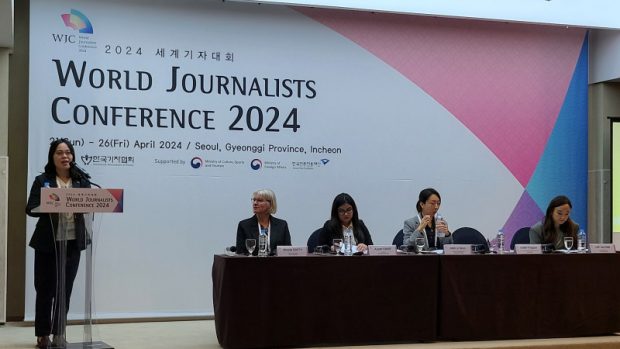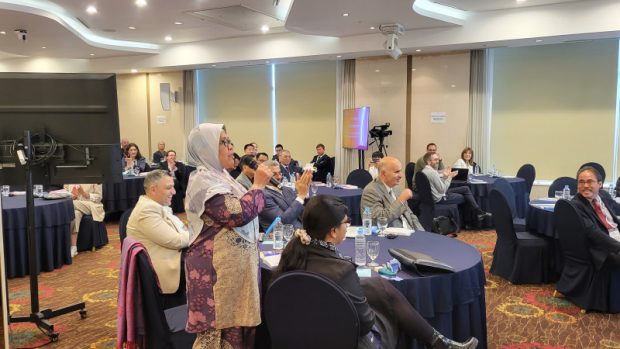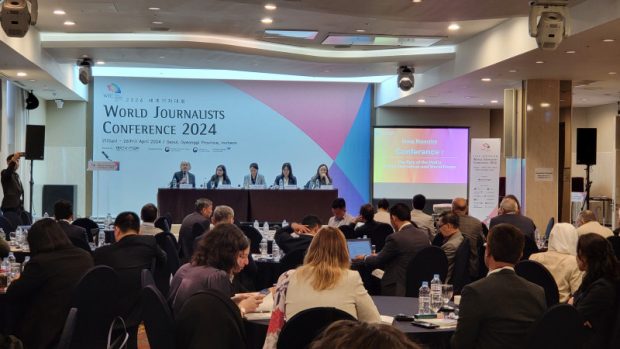
Promoting peace through responsible journalism

By Chen Yingqun,
China Daily
SEOUL: The theme of this conference is “The Role of Journalism in War Reporting and World Peace”. Although discussing war is a very bleak subject, it is crucial to think deeply about it, because wars and conflicts not only directly impact many people’s lives but could also threaten the future of human civilization and our planet.
The world is now witnessing a rise in instability and uncertainty. The conflict between Russia and Ukraine has entered the third year, with peace still remaining elusive. The long-standing conflict between Palestine and Israel has yet to find a solution, and many people in the Gaza Strip are facing severe survival challenges. In some other corners of the globe, geopolitical conflicts could erupt any moment. These conflicts have severely affected people’s lives, threatening the innocent and posing serious challenges to global peace and stability.
In this context, the role of media becomes particularly important. China Daily has always kept a close watch on the turbulent changes in the global situation. In response to the two major ongoing conflicts, our domestic and international journalists as well as the editors have conducted extensive reporting through articles, new media products, and other formats, calling for peaceful resolution of these conflicts. Regarding the role of media in war reporting and world peace, I would like to share a few thoughts.

Firstly, the media should report on wars or conflicts in a timely, accurate, and comprehensive manner. When conflicts or wars break out, media reporting becomes an important channel for the international community to understand what is really going on. Over the years, advancements in technology and the development of social media platforms have made information dissemination across the world convenient and quicker, but they have also been accompanied by a significant amount of false information and erroneous reporting. False and incorrect reporting on war or conflict could lead to misunderstanding and confusion among the public, causing unnecessary panic and anxiety.
In its coverage of wars and conflicts, China Daily draws on its extensive network of domestic and international editorial resources, making good use of various news databases and resources from media partners, striving to report what is going on to the public in a timely, accurate, and comprehensive manner.
We have interviewed officials, academics, professionals and of course members of the public, providing in-depth and comprehensive analysis of the impacts caused by the conflicts. For instance, we have published a series of in-depth reports and new media products that have comprehensively analyzed the impact of the Russia-Ukraine conflict, such as the triggering of geopolitical tensions and humanitarian crises, disrupting international industrial and supply chains, and imperiling food security.
Timely, accurate, and comprehensive reporting not only helps the world understand the truth behind wars and conflicts but also help awaken global consciousness about it. This includes promoting understanding about the need for international assistance and underlining the need to find a path to peace.

Second, I think it is essential for media outlets to maintain independence and objectivity while ensuring balanced reporting. The outbreak of wars and conflicts is often accompanied by complex disputes. Many geopolitical conflicts around the world are not caused by a single event but have a long historical development process. In the coverage of the Russia-Ukraine conflict and the Israel-Palestine conflict, it seems to me that some international media channels, either due to ideological biases or influenced by political and economic forces, have greatly amplified the voices of one side while turning a deaf ear to the voices of the other. That does a grave disservice not only to their audiences but also to truth.
China Daily is committed to providing objective and balanced reporting. We respect the different positions of parties involved in the conflict, meticulously cite various sources of information in its coverage, and analyzing the historical context and complicated origins behind the conflicts.
For us, it is important to reflect the suffering and injustice experienced by the victims, as well as to present the positions and viewpoints of different parties involved in the conflict. We also need to depict the cruelty and violence of war but also understand the underlying causes and motivations behind the conflict.
Balanced reporting can reflect the professionalism and credibility of the news media, help to reduce misinformation and bias, and improve audiences’ awareness and understanding of war. It can also promote healthier and more rational public discourse, providing important information for peace advocates and policymakers.
Third, I believe the media need to increase its focus on the notion of peace and the implementation of proactive strategies. As a country that has once suffered greatly from invasion, China and its people deeply understands the value of peace.
In the more than 70 years since the founding of the People’s Republic of China, it has never initiated a war. China has also incorporated the principle of peaceful development into its constitution. Regarding the Russia-Ukraine and the Israel-Palestine conflicts, China has maintained an objective and fair stance, insisting on promoting peace talks and hoping to contribute to world peace.
Chinese media professionals also deeply love and cherish peace, and they have integrated the desire for world peace into their news reporting. Since these two conflicts broke out, China Daily has committed itself to highlighting the calls for peace and working for peaceful solutions. We have highlighted the positive steps people of goodwill everywhere take to build trust, solve disputes, handle disagreements, and avert crises. Our reports are designed to prompt our readers to deeply ponder the realities of war and foster a profound longing for peace, all the while presenting real ways to settle conflicts. We hope to encourage people worldwide, including policymakers, to seek out and follow roads to peace, joining hands in creating a secure future for all humanity.
Media platforms are key to spreading information, and they have a significant role in supporting global peace and progress. It is my heartfelt wish that everyone, no matter where they may be, could enjoy peace. I also hope that the global media outlets work together to improve public understanding of international issues through responsible and positive reporting, foster cross-border dialogue and facilitate peaceful resolution of conflicts, thereby contributing to peace and development of the world.


